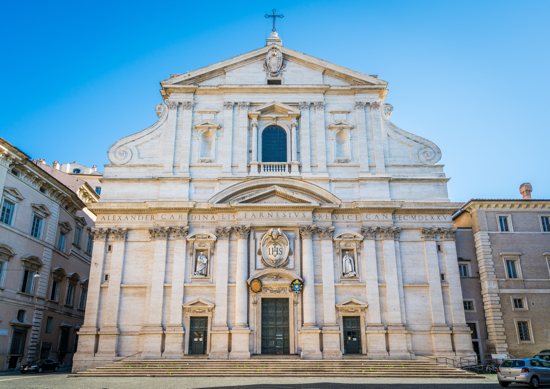
In Rome, there is a church with an arm in it.
Not just any arm, but the right forearm and hand of St. Francis Xavier, the great Jesuit missionary.
With it, St. Francis Xavier baptized hundreds of thousands of people during his mission work in Asia, devoting 11 years of his life to the cause before dying abroad at age 46.
Thousands come to visit this relic every year at a side altar of the Church of the Gesù, and it is a well-known Roman “attraction.”
And yet, the logic that animated St. Francis Xavier and his baptizing arm, the mindset that compelled him to renounce an academic career in Paris and spend his life in a faraway land, is foreign to many today, including to many of us practicing Catholics.
This was a takeaway from a recent talk in Rome by one of St. Francis Xavier’s contemporary Jesuit confreres, Father Anthony Lusvardi, who teaches at the Jesuits’ Gregorian University in Rome (and is an Archdiocese of St. Paul and Minneapolis native).
Presenting on his new book, “Baptism of Desire and Christian Salvation,” Father Lusvardi underscored the reality that for St. Francis Xavier and his contemporaries, missionary evangelization wasn’t optional; it was a Gospel demand, an absolute imperative given that, to put it bluntly, souls were on the line.
For these great Christian missionaries (think also of St. Junípero Serra, St. Isaac Jogues and the like), sacramental baptism was understood as necessary for salvation. And thus, preaching the Gospel and inviting people to receive the sacrament was about as important a mission as they could devote themselves to.
But according to Father Lusvardi, this conviction, which had animated the Church from the Apostolic Era through the Age of Discovery, began to wane in the 19th century, until today, when it “is treated with unease if not ignored altogether.”
This complacency has led to concepts like “baptism of desire” and “invincible ignorance,” which were developed by theologians of previous centuries to address the so-called “hard cases,” to be treated as sort of salvific panacea. Everyone desires God, the logic goes, and if they don’t, they can’t be blamed for it, and thus, the imperative to baptize is muted.
Ironically, Father Lusvardi’s own confrere, the 20th century German Jesuit Karl Rahner, played a big role in cementing this controversial (and, Father Lusvardi would say, I think, inaccurate) understanding of how salvation works, by promoting the idea of the “anonymous Christian.” On this account, anyone who attempts to lead a spiritual and moral life has already accepted God’s salvific grace; Christianity just exists to make that implicit faith explicit. But reception of baptism and participation in the life of the Church should not be seen as necessary.
The result of decades of this kind of thinking has led, in many cases, to toothless missions and a Church that often doesn’t really know what to do with itself. If the world doesn’t need Christ and the soul-saving mercy he uniquely offers, it’s hard for the Church to not simply turn inward on itself, or to focus exclusively on more earth-bound things, like social causes and material charity.
Father Lusvardi sees his new book as a small step toward reanimating the Church’s sense of mission, spurred on by a deeper conviction in the necessity of baptism for salvation. We all could spend time contemplating how we might be called to participate in this missionary task, whatever our vocation.
Perhaps the words of St. Francis Xavier, written in his journal while in India in 1542, and now prayerfully recalled by the Church every year on his Dec. 3 feast day, can help stir up our missionary desires:
“Many, many people hereabouts are not becoming Christians for one reason only: there is nobody to make them Christians. Again and again, I have thought of going round the universities of Europe, especially Paris, and everywhere crying out like a madman, riveting the attention of those with more learning than charity: ‘What a tragedy: how many souls are being shut out of heaven and falling into hell, thanks to you!’
“…This thought would certainly stir most of them to meditate on spiritual realities, to listen actively to what God is saying to them. They would forget their own desires, their human affairs, and give themselves over entirely to God’s will and his choice. They would cry out with all their heart: ‘Lord, I am here! What do you want me to do? Send me anywhere you like — even to India.’”
Or even to St. Paul and Minneapolis.
Liedl lives in South Bend, Indiana, and is senior editor for the National Catholic Register. He is a former longtime resident of the Archdiocese of St. Paul and Minneapolis, alum of the University of St. Thomas’ Catholic Studies graduate program and a current student at The St. Paul Seminary and School of Divinity, both in St. Paul.




